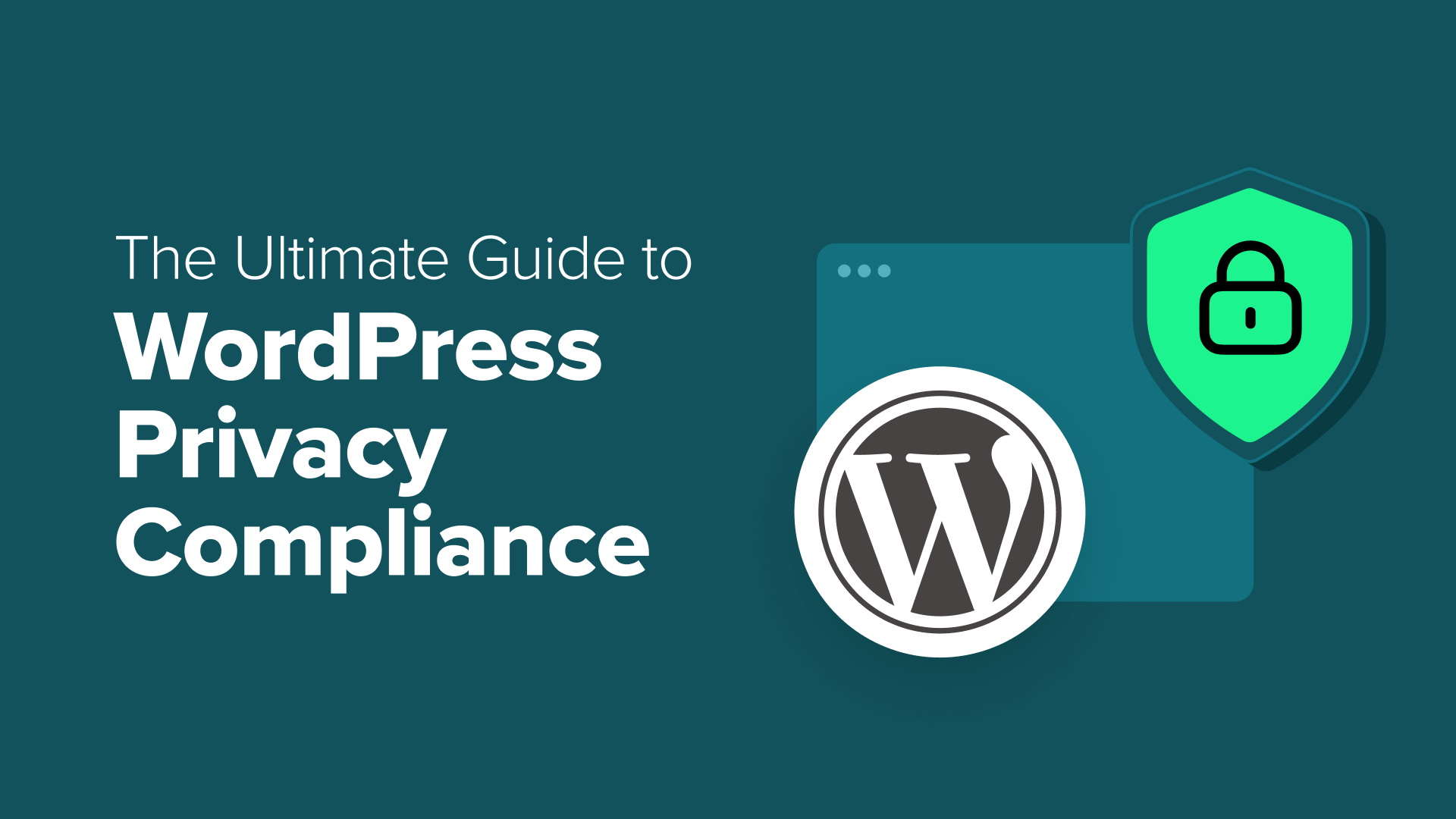I’ll be trustworthy: there was a time when privateness compliance felt overwhelming.
Between GDPR, CCPA, VCDPA, and different laws, it appeared like I wanted a legislation diploma simply to run a easy CMS web site.
However after spending plenty of time serving to web site house owners determine this out, I’ve realized that compliance doesn’t must be difficult. Typically, only a few easy adjustments can shield your web site and present guests that you just take their privateness significantly.
That’s why I created this final information to CMS privateness compliance. I’ve researched dozens of legal guidelines, examined completely different instruments, and seen firsthand what works (and what causes issues) throughout completely different CMS web sites.
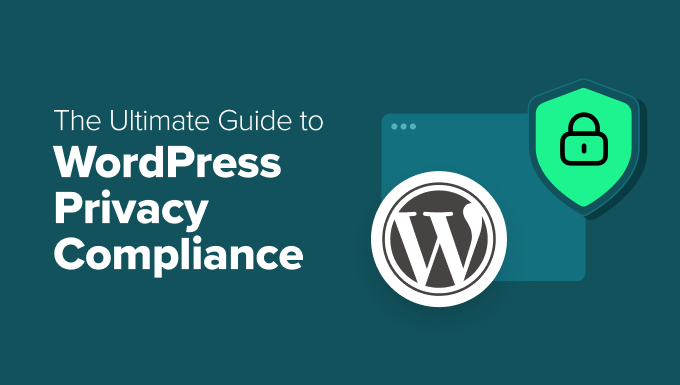

⚠️ We aren’t attorneys, and nothing on this web site must be thought-about authorized recommendation.
Why Does Privateness Compliance Matter for Your CMS Webpage?
On-line privateness legal guidelines are designed to present folks extra management over how web sites, companies, and on-line shops accumulate and use their private data.
“Private data” can imply greater than you suppose. It consists of names and e-mail addresses—but additionally issues like looking historical past, preferences, location, and even biometric knowledge.
That’s why most CMS web sites are affected by privateness legal guidelines, even when they solely accumulate fundamental knowledge like kind submissions or cookies.
Following these legal guidelines is vital for 2 causes:
- Avoiding authorized bother: Some legal guidelines, just like the Virginia Shopper Knowledge Safety Act (VCDPA), can difficulty fines of as much as $7,500 per violation. Different legal guidelines impose even greater penalties, typically reaching tens of millions.
- Constructing belief along with your viewers: When guests see that you just respect their privateness, they’re extra more likely to interact along with your web site, be part of your e-mail record, and make purchases.
In different phrases: privateness compliance isn’t only a authorized requirement. It’s a wise transfer for long-term success.
On this information, I’ll stroll you thru 12 key ideas for CMS privateness compliance. After that, I’ll break down a very powerful privateness legal guidelines which may have an effect on your web site.
Maintain studying for the last word guidelines to adjust to worldwide knowledge privateness legal guidelines.
12 Ideas for Reaching CMS Privateness Compliance
No single information can assure full compliance with each privateness legislation. However the following pointers will provide you with a robust basis. You may consider this part as your privateness guidelines for CMS.
After studying by way of these greatest practices, I like to recommend scrolling right down to the authorized part to see which legal guidelines might apply to your web site.
1. Carry out a Knowledge Audit
Earlier than you’ll be able to comply with any privateness legislation, it is advisable to know what private knowledge your web site collects and the way it’s used.
Begin by reviewing all of the instruments and plugins in your web site that work together with guests. These usually embrace:
When you’ve recognized these instruments, take a better have a look at what they do.
For every one, ask your self:
- What knowledge does this device accumulate?
- Why do I would like this knowledge?
- The place is the information saved?
- How lengthy is it saved?
- Is it shared with anybody else?
Be sure you doc your solutions. This file helps you keep organized and offers you a method to show your compliance in the event you’re ever audited or requested by considered one of your customers.
2. Gather Much less Knowledge
One of many best methods to enhance privateness in your CMS web site is to gather much less knowledge within the first place.
Most privateness legal guidelines require you to gather solely private knowledge that’s related and mandatory for a particular job. This precept is named knowledge minimization.
Check out the varieties, plugins, and instruments you utilize. For every one, it’s best to ask your self:
- What private data am I asking for?
- Do I really want this knowledge?
- Might I obtain the identical outcome with fewer kind fields or data?
If the reply is “no” or “undecided,” it’s a good suggestion to cease amassing that knowledge.
This strategy not solely reduces your authorized threat. It additionally makes your web site really feel safer and extra respectful to guests, which may enhance belief and conversions.
3. Create a Privateness Coverage
A privateness coverage tells guests what knowledge your web site collects, the way it’s used, and whether or not it’s shared with anybody.
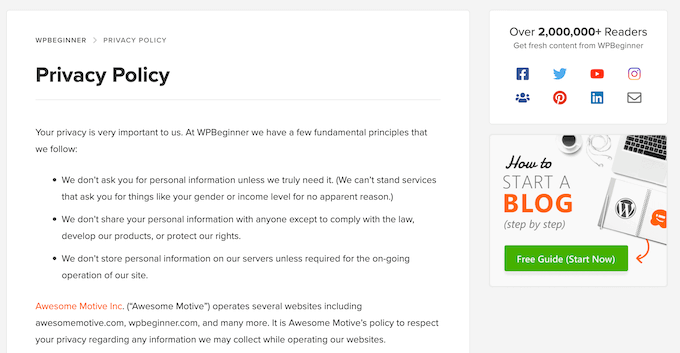

Most privateness legal guidelines require you to have a coverage like this. It helps customers perceive how their private knowledge is dealt with, which many legal guidelines discuss with because the “Proper to Know.”
Fortunately, CMS has a built-in device that can assist you create a privateness coverage. To entry this device, merely go to Settings » Privateness within the CMS dashboard.
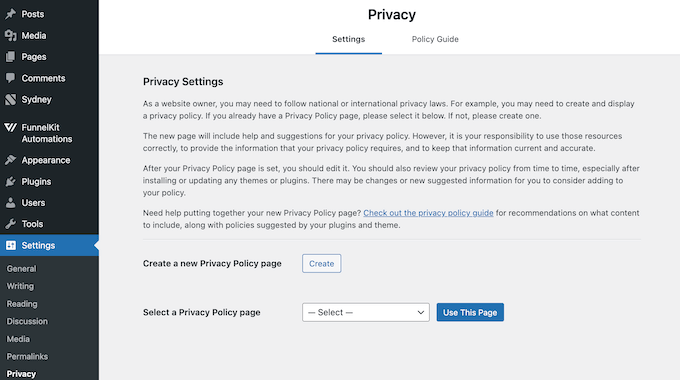

Need extra detailed directions? We even have an entire, step-by-step information on how one can add a privateness coverage in CMS.
Some privateness legal guidelines require you to get consent earlier than inserting cookies on a customer’s system. This consists of legal guidelines just like the GDPR.
A cookie popup makes this straightforward. It offers guests a transparent message in regards to the kinds of cookies your web site makes use of, what knowledge is being collected, and why. It also needs to give them a easy method to choose out.
And that is straightforward to arrange with a privateness compliance plugin like WPConsent.
For instance, we use WPConsent to show cookie banners and handle consumer selections on WPBeginner.
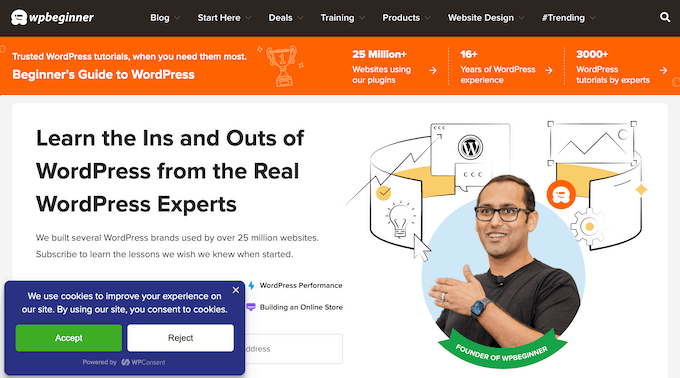

💡 Inquisitive about how we use WPConsent throughout WPBeginner and lots of of our accomplice websites? Our in-depth WPConsent assessment has extra data.
For step-by-step directions, try our full information on how one can add a cookie popup in CMS.
5. Write a Separate Cookie Coverage
A cookie popup is vital, however it’s additionally a good suggestion to create a devoted cookie coverage web page. This provides guests a spot to be taught extra about how cookies work in your web site.
Your cookie coverage ought to embrace:
- The kinds of cookies your web site makes use of (equivalent to important, analytics, or advertising and marketing)
- What every cookie does
- What private knowledge it collects (like IP addresses or looking historical past)
To construct belief, attempt to preserve your cookie coverage straightforward to grasp. This implies it’s best to keep away from technical phrases or authorized phrases which might be onerous to comply with.
Fortunately, a device like WPConsent can create this coverage for you. After putting in and activating the plugin, go to WPConsent » Settings.
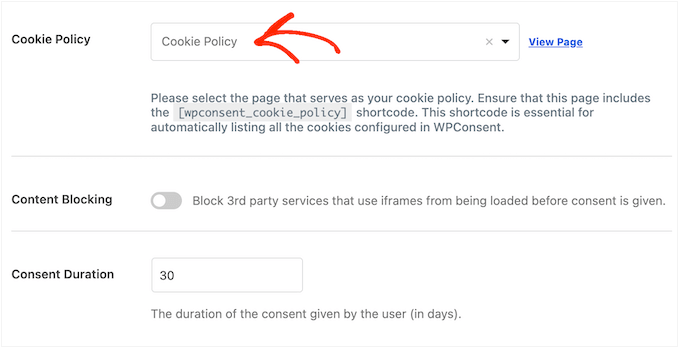

Within the plugin’s settings, select the web page the place you need to show the cookie coverage, and add the shortcode offered by the plugin.
WPConsent will then add this coverage to your chosen web page.
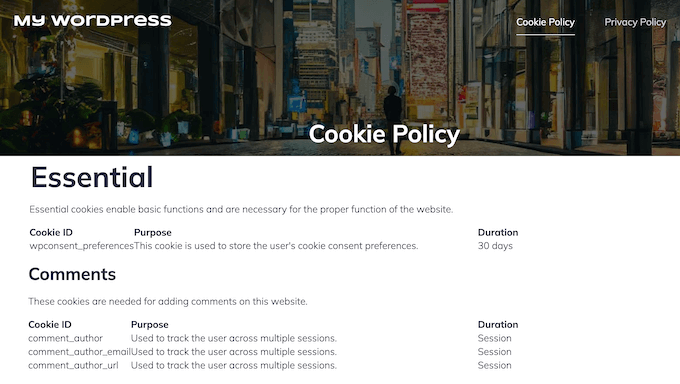

If you happen to’re utilizing WPConsent to show a cookie popup, then guests can now entry this coverage straight by clicking on the dropdown.
This may reveal a hyperlink that takes them straight to your coverage web page.
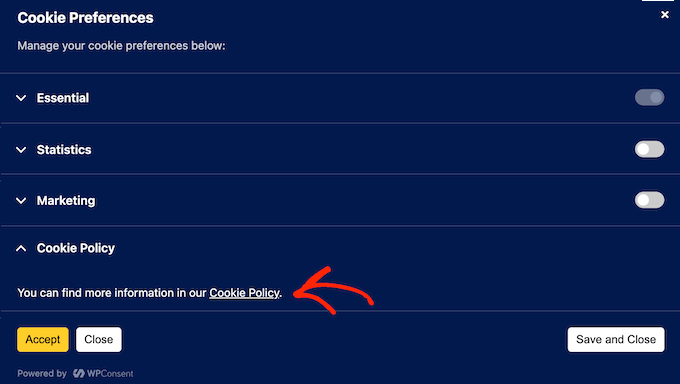

6. Block Third-Social gathering Scripts
Many privateness legal guidelines additionally apply to third-party instruments like analytics, promoting pixels, and social media trackers. If you happen to use companies equivalent to Google Metrics or Fb Pixel, then you definitely’re answerable for how these instruments accumulate knowledge.
Which means it’s best to solely enable scripts from these instruments to run after the consumer offers permission.
The excellent news is that WPConsent features a built-in script blocker that helps with this. It will probably detect widespread monitoring instruments and cease them from loading till the customer agrees.
As soon as consent is given, the script runs mechanically with no need to reload the web page.
This is without doubt one of the best methods to enhance compliance with legal guidelines just like the GDPR and CCPA.
7. Observe and Log Customer Consent
There’s at all times an opportunity your knowledge dealing with could possibly be questioned, particularly in the event you’re ever audited or somebody asks about their rights.
That’s why it’s a good suggestion to maintain a transparent file of consumer consent. It helps present that your web site takes privateness significantly.
The excellent news is, WPConsent creates this log for you mechanically.
You may test it any time by going to WPConsent » Consent Logs in your CMS dashboard.
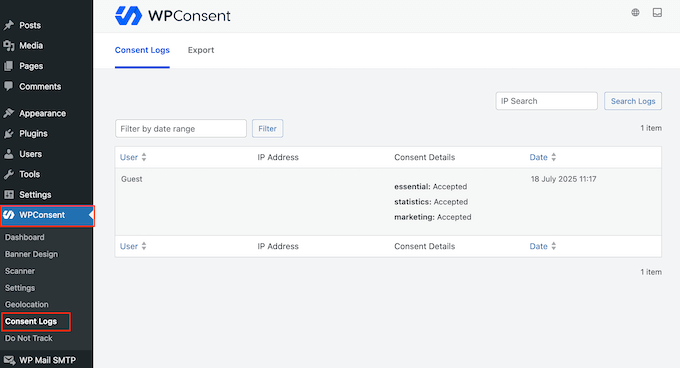

If somebody asks for proof, simply head to the ‘Export’ tab, select a date vary, and obtain the log as a CSV file.
Now you can share it straight with the consumer. Moreover, having this sort of file may give you peace of thoughts and assist shield your small business if questions ever come up.
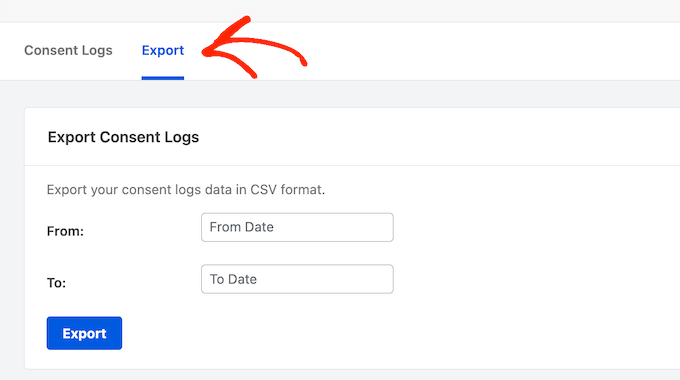

8. Present an Simple Choose-Out for Knowledge Gross sales
Some privateness legal guidelines, together with the CCPA and VCDPA, require you to present customers a method to choose out of getting their private knowledge bought or shared with third-party instruments.
It’s additionally vital to know that underneath legal guidelines just like the CCPA, ‘promoting’ also can imply sharing private knowledge with third-party promoting or analytics companions in change for his or her companies, not only for cash.
The best method to enable customers to choose out in CMS is by including a transparent, devoted opt-out web page.
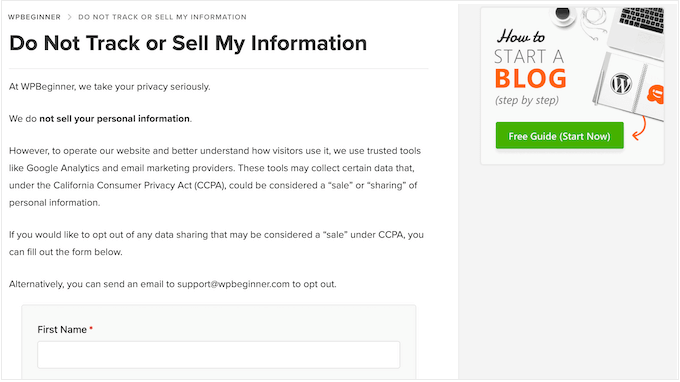

WPConsent features a Do Not Observe add-on that makes this straightforward.
It allows you to generate a kind the place customers can submit their opt-out request.


As soon as the web page is reside, guests can use the shape to cease their knowledge from being bought or shared, all with no need to contact you straight.
This creates a smoother expertise in your viewers and helps you keep compliant with vital knowledge legal guidelines.
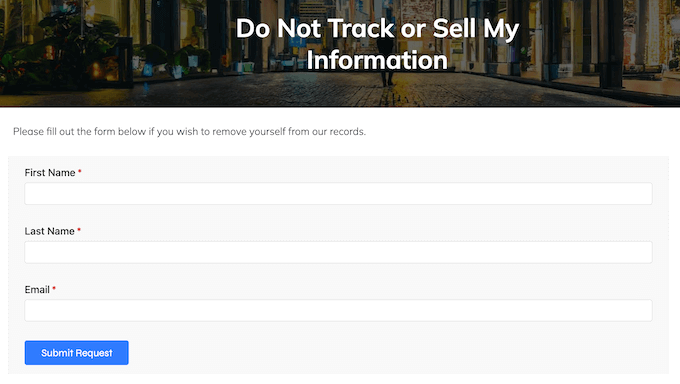

For full setup directions, see our step-by-step information on how one can create a Do Not Promote My Information web page in CMS.
9. Export and Erase Private Knowledge in CMS
Privateness legal guidelines just like the GDPR give customers the correct to entry their private knowledge, and the correct to ask for that knowledge to be deleted.
One of many best methods to help these rights is by including knowledge request and deletion varieties to your CMS web site.
That is the place WPForms is available in. It’s a user-friendly kind builder that allows you to create all types of varieties utilizing a easy drag-and-drop editor.
WPForms even has a ready-made Proper to Erasure Request Type template.
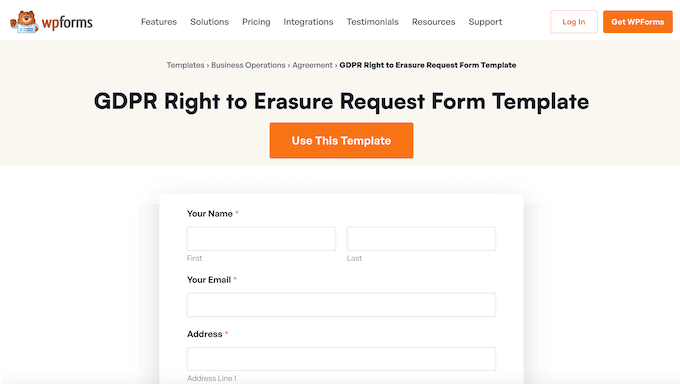

What if guests need to see their knowledge as an alternative? WPForms additionally has a Knowledge Request template.
These templates are a incredible start line for accepting knowledge erasure and knowledge entry requests in your web site.
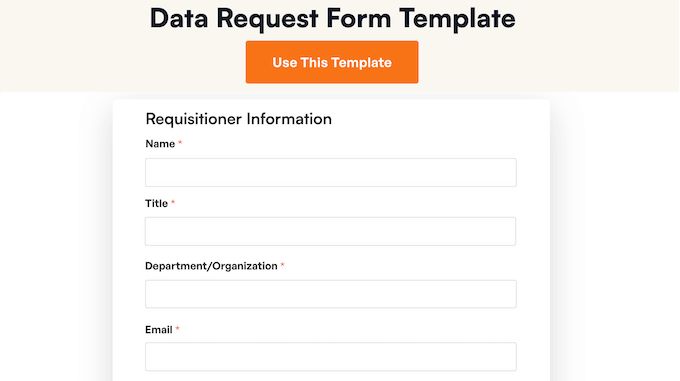

⭐ Right here at WPBeginner, we don’t simply advocate WPForms. We additionally constructed all our personal varieties with it! From contact pages to surveys, WPForms is our trusted, daily-tested resolution.
Need to see why it’s our go-to? Simply see our detailed WPForms assessment.
For a step-by-step information to getting began with WPForms, try our submit on how one can create a contact kind in CMS.
After including these varieties to your web site, WPForms will mechanically log and show all submissions in your CMS dashboard. This makes it straightforward to see new requests as they arrive in.
You may then act on these requests utilizing CMS’ built-in Export Private Knowledge and Erase Private Knowledge instruments.
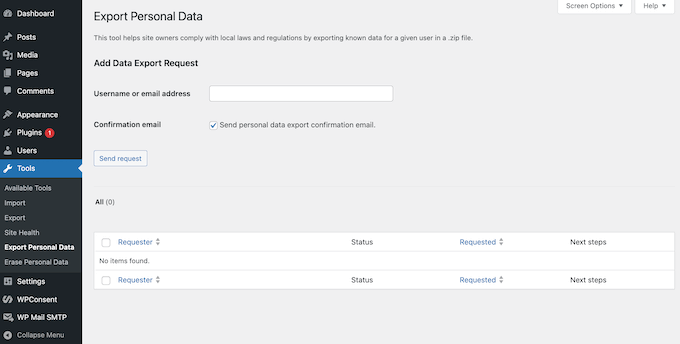

For step-by-step directions on how one can use these highly effective instruments, see our detailed information on how one can export and erase private knowledge in CMS.
10. Create Compliant Kinds
Contact varieties, quote varieties, and surveys usually accumulate private data. That implies that additionally they have to adjust to privateness legal guidelines.
If you happen to’re utilizing WPForms, there’s a built-in GDPR Settlement subject that helps you with this. You may add it to any kind and get a consumer’s express consent to retailer their private data earlier than amassing it.
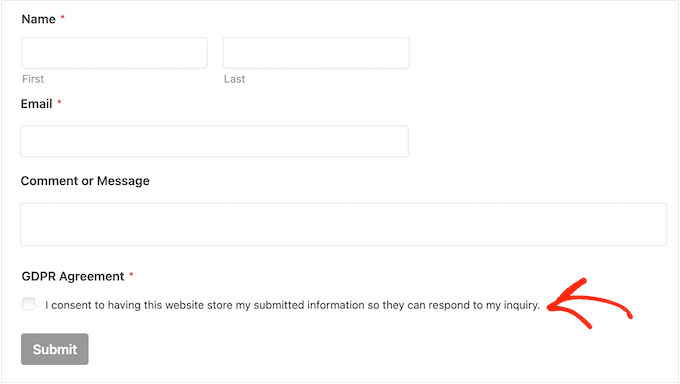

Merely drag this subject into any kind utilizing the visible builder.
It’ll add a checkbox and consent message in order that guests can comply with how their knowledge will probably be used.
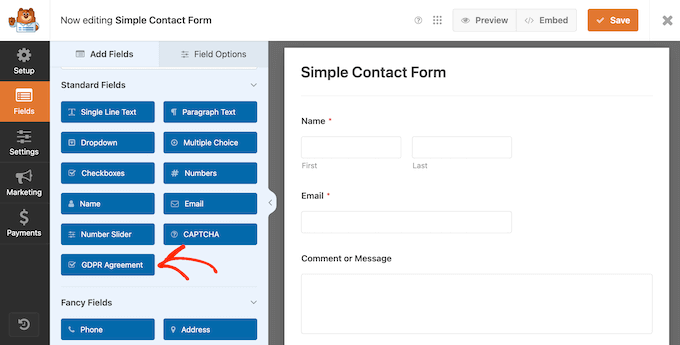

Other than the GDPR, this subject helps you keep compliant with different legal guidelines that require clear consent earlier than amassing or storing private knowledge.
Desire a full walkthrough? Simply see our information on how one can create GDPR compliant varieties in CMS.
11. Use Knowledge Privateness Compliance Plugins
If you happen to’ve been following together with this information to this point, then you have already got a stable basis for privateness compliance. However the instruments you put in in your web site matter too.
The CMS plugins you select can both make compliance more durable or provide you with built-in options that simplify the method.
Let’s have a look at one widespread instance.
Monitoring your guests with analytics helps you enhance your web site and perceive how folks work together along with your content material. This may embrace monitoring web page views, hyperlink clicks, purchases, or time spent on every web page.
However relying in your setup, analytics instruments also can accumulate private knowledge—like IP addresses, geographic location, and behavioral profiles. That’s the place issues get tough.
At WPBeginner, we use MonsterInsights to deal with this responsibly. It consists of settings to anonymize consumer knowledge or disable consumer monitoring when consent hasn’t been given.
These choices assist cut back your authorized threat whereas nonetheless providing you with the insights it is advisable to develop your web site.
In fact, analytics are only one a part of the puzzle. Plugins like WPConsent and WPForms additionally aid you handle cookie banners, accumulate knowledge responsibly, and course of requests like opt-outs and deletions.
You’ll discover extra choices in our skilled roundup of the most effective CMS GDPR plugins.
When somebody leaves a remark in your CMS web site, they often have to enter their title, e-mail handle, and presumably a web site URL. That’s private knowledge, so it’s lined by privateness legal guidelines.
CMS features a privateness checkbox for feedback by default. This provides customers an opportunity to comply with the storage of their data earlier than submitting a remark.
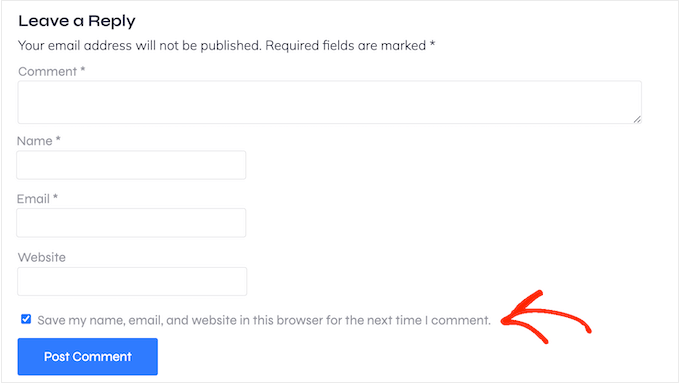

Nonetheless, some themes use a customized remark kind which may not embrace this checkbox by default.
If you happen to don’t see the checkbox in your web site, then it’s a good suggestion so as to add it manually. You should utilize a plugin like Thrive Feedback or add some customized code to your web site.
For step-by-step directions, try our information on how one can add a GDPR remark privateness opt-in checkbox.
Key Laws Impacting CMS Websites
CMS privateness compliance usually is determined by which legal guidelines apply to your web site, and that’s not at all times straightforward to determine.
Some legal guidelines apply to particular areas. Others apply provided that you accumulate a specific amount of knowledge or meet a business-size threshold.
On this part, I’ll stroll you thru the commonest privateness legal guidelines that have an effect on CMS web site house owners.
You don’t have to develop into a authorized skilled, however it’s useful to know which guidelines chances are you’ll want to think about with the intention to take the correct steps.
The Basic Knowledge Safety Regulation (GDPR)
The Basic Knowledge Safety Regulation (GDPR) is a European Union (EU) legislation designed to present EU residents extra management over their private knowledge.
Merely put, you need to get express, particular, and clear permission earlier than amassing private knowledge from anybody residing within the European Union.
You should additionally clearly inform EU residents the place, why, and the way you’ll course of and retailer their knowledge.
Beneath the GDPR, people even have the correct to obtain their private knowledge and the “proper to be forgotten.” This implies they’ll ask you to delete their knowledge at any time.
For extra data, our final information to CMS and GDPR compliance is a must-read useful resource.
California Shopper Privateness Act (CCPA)
The CCPA is a privateness legislation that provides California residents extra management over their private data. It permits them to see what knowledge is collected, the way it’s used, and who it’s shared with.
This legislation applies to for-profit companies that meet a minimum of considered one of these standards:
- Have annual gross income over $25 million.
- Purchase, promote, or share private knowledge from 100,000 or extra California residents per 12 months.
- Make a minimum of 50% of their income from promoting or sharing private knowledge.
It doesn’t matter the place your small business is positioned. In case your CMS web site serves folks in California and meets considered one of these thresholds, then the CCPA might apply.
The legislation additionally requires you to supply an opt-out for knowledge sharing and to answer requests to view or delete private data.
You may be taught extra in our final information to CCPA compliance for CMS.
The Private Knowledge Safety Regulation (PDPL) – Saudi Arabia
Private Knowledge Safety Regulation (PDPL) is a privateness legislation that units clear guidelines for the way companies can accumulate, use, and retailer the non-public knowledge of Saudi residents.
Ignoring the PDPL carries substantial dangers. Fines can attain as much as SAR 5 million (about $1.3 million USD) per violation, and this quantity can double for repeat offenses.
If any of your clients or customers reside in Saudi Arabia, then it’s best to try our newbie’s information to PDPL compliance. It exhibits you how one can navigate this vital legislation and keep away from these steep fines.
The Utah Shopper Privateness Act (UCPA)
The Utah Shopper Privateness Act (UCPA) is designed to guard the non-public data of Utah residents.
Like another privateness laws, the UCPA’s attain extends past Utah’s borders. In case your web site targets customers in Utah—for instance, by way of advertising and marketing or companies—then the legislation may apply, even in the event you’re positioned elsewhere.
Nonetheless, don’t fear in the event you’re a smaller weblog or web site. Similar to the CCPA, the UCPA is principally aimed toward bigger companies.
First, your small business must function in Utah or provide services or products focusing on Utah residents. Subsequent, your small business will need to have an annual income of $25 million or extra.
You’ll additionally want to fulfill a minimum of considered one of these knowledge thresholds:
- Management or course of the non-public knowledge of 100,000 or extra Utah customers yearly.
- Recover from 50% of your gross income from promoting private knowledge and management or course of knowledge from 25,000 or extra Utah customers.
For extra data, I like to recommend trying out our final newbie’s information to UCPA compliance in CMS.
The Virginia Shopper Knowledge Safety Act (VCDPA)
The Virginia Shopper Knowledge Safety Act (VCDPA) is a state-level privateness legislation.
Nonetheless, the VCDPA doesn’t apply to each single web site. It’s one other legislation that primarily targets huge companies.
In actual fact, you sometimes solely have to adjust to the VCDPA if your small business meets considered one of these situations:
- You management or course of the non-public knowledge of 100,000 or extra Virginia customers in a 12 months.
- You management or course of the non-public knowledge of a minimum of 25,000 Virginia customers and get greater than 50% of your complete revenue from promoting private knowledge.
Our newbie’s information to VCDPA compliance covers plenty of completely different recommendations on how one can adjust to this legislation.
CMS Privateness Compliance: Continuously Requested Questions
I do know it is a lot to soak up, particularly in the event you’re simply getting began with CMS privateness compliance. So earlier than we wrap up, I need to rapidly reply among the commonest questions I hear from inexperienced persons.
These solutions aren’t meant to interchange authorized recommendation, however they’ll aid you perceive what issues most in the case of working a privacy-friendly CMS web site.
Do I would like a privateness coverage if my web site doesn’t accumulate knowledge?
Sure, even when your web site doesn’t appear to gather consumer knowledge straight, it’s nonetheless a good suggestion to have a privateness coverage.
That’s as a result of your web site could also be amassing data in ways in which aren’t instantly apparent. For instance, your internet hosting supplier may log customer IP addresses, or third-party scripts could possibly be monitoring conduct within the background.
In these circumstances, having a privateness coverage helps preserve you on the protected facet of the legislation.
It additionally exhibits your guests that you just’re being clear, which may go a great distance towards constructing belief.
What are the penalties for non-compliance?
Privateness legal guidelines can carry critical penalties in the event you don’t comply with them.
Some laws embrace fines of 1000’s and even tens of millions of {dollars}. You might also be charged per violation.
For instance, underneath the CCPA, penalties vary from $2,500 to $7,500 for every affected consumer. That may add up quick if the difficulty impacts numerous folks.
However cash isn’t the one concern. If customers discover out their knowledge wasn’t protected, they might lose belief in your web site. That type of injury is tough to restore and may result in fewer visits, decrease engagement, and misplaced gross sales.
How usually ought to I assessment my web site’s compliance?
It’s a good suggestion to assessment your web site’s compliance a minimum of every year.
You’ll additionally need to test each time a privateness legislation adjustments or a brand new one goes into impact. Staying proactive might help you catch small points early and keep away from larger issues later.
I hope this final information to CMS privateness compliance has helped you’re taking the primary steps in the direction of making a compliant web site. Subsequent, chances are you’ll need to see our skilled picks for the greatest safety plugins to guard your web site or our information on how one can know in case your web site makes use of cookies.
If you happen to preferred this text, then please subscribe to our YouTube Channel for CMS video tutorials. It’s also possible to discover us on Twitter and Fb.

